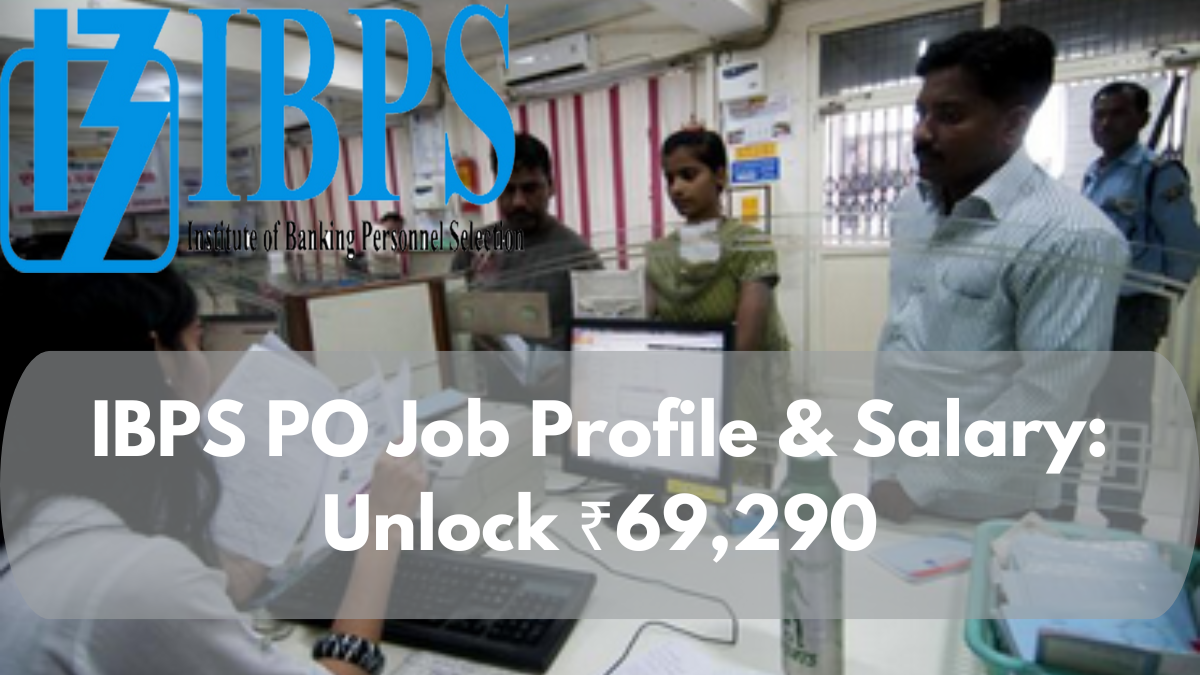The IBPS Probationary Officer (PO) position is one of the most coveted roles in the banking sector. Known for its competitive salary, financial stability, and numerous perks, this role attracts thousands of aspirants annually. In addition to monetary benefits, IBPS POs enjoy allowances, career growth opportunities, and other incentives that make this job financially and professionally rewarding.
This article provides a detailed analysis of the IBPS PO salary, including its structure, components, benefits, insights into job responsibilities, and career progression.

IBPS PO Salary Breakdown: Structure and Components
The IBPS PO salary is determined based on the guidelines of the 7th Pay Commission. However, the upcoming 8th Pay Commission may further revise these figures. As per the 12th Bipartite Settlement, the basic pay for an IBPS PO starts at ₹48,480. When allowances such as Dearness Allowance (DA), House Rent Allowance (HRA), and others are added, the gross salary reaches approximately ₹83,125 monthly. After mandatory deductions like taxes and National Pension Scheme (NPS) contributions, the net in-hand wage stands at around ₹69,290.
Detailed Components of IBPS PO Salary
The IBPS PO salary comprises various elements which collectively contribute to the officer’s earnings. Below is a breakdown of each salary component:
| Component | Details | Amount/Percentage |
|---|---|---|
| Basic Pay | Fixed starting salary | ₹36,000 to ₹48,480 (initial stage) |
| Dearness Allowance (DA) | Compensation for inflation | 23.87% of Basic Pay |
| House Rent Allowance (HRA) | Assistance for housing expenses | 7%–9% of Basic Pay |
| City Compensatory Allowance | Varies by city type | 0%–4% of Basic Pay |
| Special Allowance | Additional earnings not tied to expenses | 7.75% of Basic Pay |
Let’s explore each of these components in detail:
1. Basic Pay
The basic pay forms the foundation of the IBPS PO salary. For newly appointed officers, the initial basic pay is ₹36,000, which progressively increases with promotions and periodic increments. The latest revision under the 12th Bipartite Settlement raised the maximum basic pay to ₹48,480.
2. Dearness Allowance (DA)
The Dearness Allowance (DA) is designed to offset the impact of inflation and rising living costs. It is calculated as a percentage of the basic pay and is revised quarterly based on the Consumer Price Index (CPI). Currently, DA stands at 23.87% of the basic pay, meaning the higher the base salary, the more the DA receives.
3. House Rent Allowance (HRA)
The House Rent Allowance (HRA) supports officers in meeting their housing costs. The percentage of HRA depends on the city of posting:
- Metro Cities (e.g., Delhi, Mumbai): 9% of Basic Pay
- Urban Areas: 8% of Basic Pay
- Rural and Semi-Urban Areas: 7% of Basic Pay
This allowance ensures officers can manage housing expenses comfortably, regardless of location.
4. City Compensatory Allowance (CCA)
The City Compensatory Allowance (CCA) is location-specific and varies depending on the city’s cost of living. Officers posted in metropolitan cities receive up to 4% of the basic pay, while those in smaller towns or rural areas may not receive this allowance.
5. Special Allowance
The Special Allowance is a fixed percentage of the basic pay, currently at 7.75%. It is an additional boost to the officer’s earnings but is not tied to any particular expenses.
In-Hand Salary of IBPS PO
After factoring in all allowances and deducting taxes, NPS contributions, and other charges, the approximate in-hand salary for an IBPS PO is ₹69,290 per month.
Additional Perks and Benefits of IBPS PO
Beyond the salary, IBPS POs enjoy several non-monetary benefits that enhance the appeal of this role:
- Accommodation Benefits: Officers are provided with official quarters or a housing allowance based on location.
- Travel Allowance: Reimbursement for travel expenses, including petrol costs for personal vehicles.
- Medical Coverage: Annual medical allowance of up to ₹80,000 ensures healthcare expenses are covered.
- Newspaper Allowance: Monthly allowance for newspaper subscriptions.
- Pension Benefits: Enrollment in the National Pension Scheme (NPS) secures financial stability after retirement.
Job Responsibilities of IBPS PO
An IBPS PO has a dynamic role that includes a wide range of tasks, such as:
- Customer Service: Assisting customers with account-related queries and resolving issues.
- Branch Operations: Managing day-to-day branch activities for smooth operations.
- Loan Processing: Reviewing and approving loan applications based on eligibility criteria.
- Business Development: Promoting banking products and attracting new customers to increase revenue.
Career Growth and Promotion
The IBPS PO role offers exceptional career advancement opportunities. Officers can grow through merit-based promotions or seniority. The promotion hierarchy is as follows:
- Junior Manager (Scale I)
- Manager (Scale II)
- Senior Manager (Scale III)
- Chief Manager (Scale IV)
- General Manager (Scale V)
- Executive Director
Promotions come with significant salary increments and added responsibilities, enabling officers to climb to prestigious leadership roles over time.
FAQs
1. What is the starting salary of an IBPS PO?
The starting basic pay is ₹36,000, which increases over time with increments and promotions.
2. What is the in-hand salary of an IBPS PO?
After deductions, the approximate in-hand salary is ₹69,290 per month.
3. Does IBPS PO salary increase over time?
Yes, the salary increases significantly with periodic revisions like the Bipartite Settlements, promotions, and annual increments.
4. What are the additional perks provided to IBPS POs?
IBPS POs enjoy housing benefits, travel, medical coverage, pension schemes, and newspaper allowances.
5. What is the role of an IBPS PO in a bank?
The primary responsibilities include customer service, loan processing, branch operations, and business development.
Click Here To Know More

Abhishek is an avid job enthusiast with a passion for uncovering the latest job vacancies. From the most recent admit card news to trending recruitment updates, Abhishek thrives on exploring what’s new in the job market. Abhishek delivers comprehensive insights and honest opinions to readers, helping them navigate their career paths with confidence and clarity.
